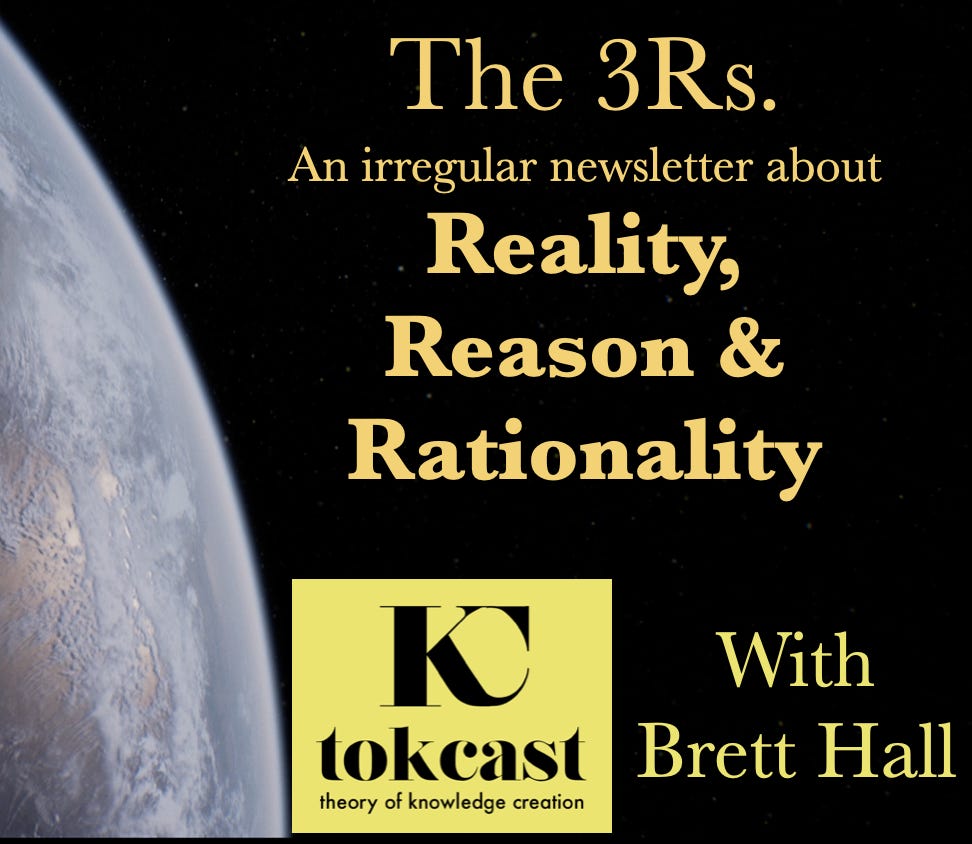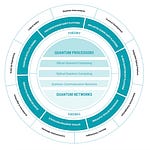Manners and Marketing
I am presently part way through the editing phase of the next episode of ToKCast devoted to Steven Pinker’s book “Rationality”. The next chapter I am dealing with is “Probability” and his book, as I keep saying, is an excellent overview of Rationality as understood by mainstream academia. The last episode of ToKCast (ep 111) was my discussion of Deutsch’s talk on Probability titled Physics without Probability and I think that talk by David serves as what might be called the most up to date gold standard understanding of what probability is given our best understanding of reason and reality - especially quantum theory and the rest of physics. So having completed that episode it’s made it difficult not to be hugely nit-picky. Now I am a nit-picker but that can be important for rationality. Focussing on the small errors and the big errors might take care of themselves. Well, not literally. But sometimes one can find patterns in the noise of error and then it can make the analysis move somewhat more swiftly. So in this case looking closely at Pinker’s book “Rationality” when it comes to the probability chapter it became apparent there was a particular pattern of errors or misconceptions. And once I thought I’d identified those, then it made appreciating the rest of the chapter for what it was somewhat more simple. So that should be coming out soon.
I should say at this point that this is rather like a mini podcast and for this episode - just the first - it will be longer than I plan on any future newsletter being (with the possible exception of the second episode too!). I’m getting used to the format - I may or may not continue to publish this on my usual channels. Maybe this first one can serve as the advertisement for listeners to sign up to the newsletter. Links in the description for that. But I don’t plan on polishing this quite as much as I do with the actual ToKCast episodes. Without further ado let me get into the newsletter - my meanderings and ramblings for this first episode.
So what’s been cropping up for me recently across both media and social media is the matter of manners - especially in public discourse. For a while I bought into the idea that manners were just time wasting. Get to the point and so on. In many cases this is true: legal or business situations. But we exist in a culture and the culture has traditions and they exist for a reason. And what is interesting to me is academic and intellectual culture and where manners seem to be in some places at least on the decline and it only appears to have negative consequences.
It is astonishing to me that many of those I looked up to (they perhaps might not have been “intellectual heroes as such) when I was younger: like the academics who both taught me and those who occupied the stratospheric positions of expertise and authority at our oldest institutions of learning are so very often these days in terms of their public personas so very impolite and impolitic - not least online. It seems they do not care how good a job they do of turning off the young from those topics I used to find so very interesting. I looked up to Paul Davies when I was younger. I knew he was a great physicist and science communicator. Of course he would be above crass and petty disagreement. He was every bit a polite gentleman. He remains that as far as I know. But then: he’s also not on social media.
There are important exceptions that are on social media and who manage to remain perfectly courteous. One might think that’s hard. But is it? I see too many academics rising to the bait - but really it’s not rising it’s depending into a gutter of personal insults. And so we have some of the brightest young minds young men and women turning less to science and more readily to - well let me pick a quick example - crypto and entrepreneurship. Now maybe that’s all for the good. Why not? When the examples of clear minds and engaging discussions are often seemingly framed in more mature language and depth than the, I have to say, rather often rather more childish, partisan and surlish content sometimes found in the feeds of scientists online. Or insofar as some business people are partisan and discourteous and rude - well at least they’re rich and having fun it seems! The scientists and intellectuals aren’t even doing that much. They seem to hate their work, despise those they work for and don’t seem particularly happy with their own life choices. So that’s what I’m reacting to today. Is there one thing that has set me off? Well there are a number of things that came one after another but the straw that broke the camels back so to speak came from a historian of science writing about Neil de Grasse Tyson. I’ll come back to it. After all when I am not producing yet more material about how I agree with Deutsch or Popper I am producing material about how I disagree with some other thinker - like Pinker in some places or like Tyson or Bostrom and so on in others. But I would hope that however passionate I get on those points or however much I chastise some of that content, I am not being rude in doing so. I’m not trying too much to analyse the psychology of those people - I’m more interested in their ideas and how those ideas represent misconceptions about reality. And yet I read things like this article I’m linking to in the description or the transcript to this audio and https://thonyc.wordpress.com/2022/04/13/nil-degrasse-tyson-knows-nothing-about-nothing/ reading it I wonder: why? Just: why? Why say for example, even if it’s a joke, that Tyson “knows nothing”? Why say he is spouting “total crap” and so on. I disagree with Tyson a lot. But - and like I say I’ll come back to this - I think it actually hampers the potential for error correction. Sometimes I think - forget compulsory military service or school - everyone should be forced into doing a 2 year front facing tour of duty in retail at times. There is a lot of rudeness in society. I do not only mean online I mean you see it so often - the so-called COVID Karen came out in force in retail settings. Yes yes, sometimes the shopkeeper behaved absurdly but rather more often it was the crazy customer who was under the misapprehension they had a right to service or some such. That the supermarket amounted to the public square and any poor employee on their 11th hour of a 12th hour shift for the 6th day straight that week really needed to hear how it was their constitutional right both to be served and not wear a mask amidst a cloud of expletives. Covid certainly exaserbated all that and highlighted the importance of courtesy: the efficiency of manners. If you want the transaction to go as fast, smoothly and friendly as possible in the grocery store or restaurant or anywhere at all obey every rule of the establishment to the letter and get though it nicely. Wear the mask. Keep your distance, smile and have a nice day. Ok, common sense.
But then in the academic world this also works. Perhaps sometimes some professors have been told since the 3rd grade they are the smartest person in the room and everyone hangs on their every word. Perhaps it takes some time before someone finally disagrees with them because that someone isn’t reciting a textbook because perhaps they’ve moved beyond it. Or not - maybe they’re a crank. Or maybe just mistaken. But there is a method to avoid madness here and it’s manners. Again on academia - how many have held other jobs? This is not to say such a thing is necessary - it’s not necessary. I know academics who are perfectly and consistently polite at every turn, online and off, and they’ve had scholarships all throughout their formal learning, got grants and positions immediately and really if the word privilege is to apply anywhere it’s to them. And yet they are wonderfully nice people.
But there are others. There are others. I guess they’re everywhere and the PhD credential or earning tenure or its near equivalent does not require one to pass over a hurdle labelled “pleasant human being”. Ok, so we cannot always all be consistently pleasant. But how about online when you’ve got Professor or Dr in your bio alongside your pronouns and you are engaged in a discussion about your precise domain of expertise. So far myself I’ve rarely been on the receiving end happily - but I have seen others so chastised. It’s not a great advertisement for the institution all else left aside. And no, I won’t be calling out names on that one.
As someone who follows in the tradition of Popper I’m an admirer of so-called critical rationalism. Now critical rationalism is all about criticism: finding flaws and errors in claims and seeking to correct them. And criticism has a bad name because people misdirect their criticism away from ideas and onto people. And perhaps that’s a beef I have. It perpetuates this notion of criticism as being a bad thing or an undesirable thing and that critics are people who are critical of people - which they should never be. I say it’s a category error to criticise a person because a person is that thing that generates ideas and can direct its attention here or there. It can choose what to focus on - it has that capacity to freely choose. All of that together is the way ideas - knowledge is generated and criticised. But to criticise that entity that does the idea making is to confuse the product (the idea) with the process (the person). The idea should be criticised and corrected for the purposes of progress-improving it. But criticising the very means of creating the idea in the first place-the person - I think that’s just plain pointless because we don’t know and no one knows how they really create ideas at all. I’ve said more on this elsewhere so I won’t linger on it further. But criticism can of course be undesirable if it’s being offered where and when it’s not wanted. But it’s always undesirable when directed at a person.
For example, a field close to my heart is astrophysics. I worried out loud recently that there has been a turn in the culture there not merely indifferent to wealth and commercial success - but actively antagonistic towards it. I compare this very modern phenomena in astrophysics to the way in which wealthy individuals and those who explored the cosmos once had a very symbiotic relationship. But no more it seems. Not least because astrophysicists in particular look to governments for their funding and so they feel free to turn their nose up at business people. It’s a shame but you can read more about my thoughts on that “turn for the worse” here: https://www.bretthall.org/blog/astronomical-disdain And what I describe in that piece is the very personal attacks on the character of Elon Musk. Well he’s a big rich boy he can take it. No doubt. But it’s coming from professional astrophysicists. Who should be natural allies of his. That was a little more than a week ago I wrote that long blog post. Then this week - more.
What more? Well now a contingent of astrophysicists (I follow a number on my main twitter account and periodically check in with others) this contingent were complaining out loud on social media once more about their work (which is not unusual) - but this time they are complaining about their very own students. So I guess it must be examinations time or something and they are bemoaning quite publicly about perceived lack of study or effort or some such. I don’t know if these professors think their own students might not be following them. Or their own employers or whatnot. Or if no one cares about any of this - which would be bizarre. Anyway - one junior professor who appeared in my feed was complaining about how in the course (an undergrad physics course) that he teaches at university that in theory lasts for 15 weeks one or more students did not turn up for the first X number of weeks (perhaps most of the weeks) and then in the final 2 weeks or so they try to cram it all in. He was essentially saying not only does this not work *it is not permitted*. By him.
His colleagues and peers all offered him words of support online. Only one comment at all pushed back about how some young people find undergraduate subjects - like high school - too slow and simple and they literally can get what needs to be done in those final two weeks. Many can get done 15 weeks of work in 2. I would add that given what those students experienced over the last 2 years with covid it should be expected that they have lower tolerance for a 15 weeks on campus series of bi-weekly lectures and tutorials where the pace is far slower than how quickly they learn to do literally anything else in their lives. Why not just assess the students regardless of how often they turned up or participated and see if they meet the standards set? What is it about attendance? I mean assessments are bad enough - but attendance now? Why can’t a student do the learning elsewhere, where they like, in their own time? And if they do, could we at least keep the professor’s complaints about them offline? I may be getting old. I just cannot imagine professors complaining out loud online about this in my day. Of course they did - but that’s what staff rooms and cafe conversations with immediate superiors are for, aren’t they?
On top of all of this I would add: the universities seem in many ways to be in a precarious position. It’s true that *for the moment* their product (which is credentialing as much as it is educating) seems to have an unending stream of customers. However those customers are changing. Many now realise that learning to code (for example) outside of the university system confers almost all the advantages (and more) with none of the drawbacks. Writers, bloggers, YouTubers, creative types, technology types and even some kinds of science types can see the benefit of not extending what really is their high school experience for another 4 years or so. The knowledge needed to succeed in the modern knowledge economy might be better found outside the university system. So if universities want to attract the best and not those that perhaps have no other options as the trend might start to become - a little more marketing from the academics at least on social media might be in order. Manners is marketing I would have thought. Don’t turn off potential customers - I mean students - no I mean customers - with a public facing stream of complaints on twitter and elsewhere about your horrible work life and the lazy students.
Look it might well be the case that institutions called universities aren’t going anywhere at all, I guess - but those working in them are in the precarious place I describe because the demand for certain things and certain kinds of learning is changing. So your expertise in high demand now might not be tomorrow. Perhaps. And the university as it exists now as the or the sole centre of higher learning much less the most prestigious centre of learning in a community is in a precarious situation.
There is a sense some universities are like libraries. They exist in a market which barely exists and with no competition because the state protects them from needing to perform. Libraries still exist but - well just go to a library. I know what those in my area are like: they are really just places for school students to study. Like cafes but with more books and less noise. Very few people borrow books at the rates they once did - they do not need to. And everyone on their smartphone has access to all the books and information any library can offer. The library offers space and public toilets. And perhaps the government should provide that - although I am with Penn Jillette on this one (see here cued to the right spot about whether and to what extent libraries should be funded with taxation dollars) But there is an inertia to the whole thing. University education like school education really is the horse and cart trotting along the highway when there are Tesla’s zooming along in the fast lane, high speed rail zipping along beside and jet airliners flying overhead.
There might always be a demand for Engineering and Medicine credentialing at an “institution” with some sort of government imprimatur (or at least some third party “guarantee” of quality) and universities have the advantage of political power. Leaders - politicians - are rather often “expert driven” - we need to have advice from experts lest they be accused of “ignoring the science” or “ignoring the experts” and so the experts from the universities will always produce studies that say how beneficial universities are to the economy. What else can politicians do? Wait for a collision with reality ultimately.
In the pure sciences there is a strong argument it may just be the case that “group think” is slowing progress and young people who come to understand this phenomena in high school have an advantage because they could could right now be beginning to seek out alternatives.
Why learn the physics that everyone else will learn at university from 18 to 21 years of age when those 3 or 4 years could be spent learning something truly new and really trying to make inroads in ways most PhD students barely begin to do? As for artists and creators - well - who wants to sit through hours of material weekly on theory when that time could be devoted to precise and production and, quite realistically, earning? It would seem all the university can offer over free or almost-free online alternatives is the “credential” - the certificate testifying to the fact “I have the knowledge”. But even then recruiters in many spaces know: is that degree anything like a guarantee? Even Google now (apparently) barely considers formal university credentials and instead considers portfolios (evidence of what you have actually done out there in the real world) and should it be required - they have their own in-house credentialling system of practical course work.
So there might be good reasons we’ll see for youngsters out of high school to completely eschew the formal tertiary education system and go for something else. One reason is: well it’s old. But also if the representatives of it on social media are anything to go by: well do you want to entrust 3 or 4 years or even more of your life to them? In some cases the answer has to be no. So we should expect a sea change or cultural shift when it comes to what young people with an intellectual or even creative bent aspire to. Do they want formal training via an old institution or do they desire something else? And what will be the reaction? Well we know since ancient times that what adults think of the youth has a tradition of regarding their rebelliousness as something hazardous and unwelcome. But that I’ll save for next time.
Before I finish up:
I would rather everything I create (or almost everything) to remain entirely free and available to all.
Four reasons
The people I admire most have always done exactly this.
There is a long tradition of this in “knowledge creation” specifically science that I do not think is obviously improved upon by a paid model
Much of my material I credit the vast bulk to, to David Deutsch and others. It feels wrong to charge for exclusive access to what I regard in essence as the ideas of others.
The work I do in spreading the ideas of Deutsch, Popper, Feynman and others from physics and philosophy is something I want to go as far and wide as possible so I don’t want to limit anything to being paid.
All of that said I accept donations for the same reason anyone accepts payment ever: one has bills to pay and may need to upgrade technology at times so that some of those videos can have the fancy visuals. So I do have means of donation for those who would like to support me. Just go to www.bretthall.org and there on the front page are links to Patreon and Paypal and I should let you know for those who do contribute I have been happy to engage with many over the last few months in asynchronous voice messaging on WhatsApp. My supporters are small in number which makes that kind of thing feasible for now, anyways.
Until next time!















Share this post